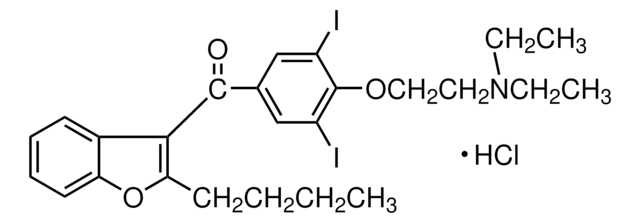BP531
(2-Butylbenzofuran-3-yl)(4-hydroxy-3,5-diiodophenyl)methanone
British Pharmacopoeia (BP) Reference Standard
Synonym(s):
NSC 85437
About This Item
Recommended Products
grade
pharmaceutical primary standard
API family
amiodarone
form
solid
quality
British Pharmacopoeia (BP) Reference Standard
shelf life
limited shelf life, expiry date on the label
manufacturer/tradename
BP
application(s)
pharmaceutical
pharmaceutical small molecule
format
neat
storage temp.
2-8°C
InChI
1S/C19H16I2O3/c1-2-3-7-16-17(12-6-4-5-8-15(12)24-16)18(22)11-9-13(20)19(23)14(21)10-11/h4-6,8-10,23H,2-3,7H2,1H3
InChI key
PNFMEGSMKIHDFZ-UHFFFAOYSA-N
Looking for similar products? Visit Product Comparison Guide
General description
Application
Packaging
Other Notes
related product
Storage Class Code
11 - Combustible Solids
WGK
WGK 3
Flash Point(F)
Not applicable
Flash Point(C)
Not applicable
Regulatory Listings
Regulatory Listings are mainly provided for chemical products. Only limited information can be provided here for non-chemical products. No entry means none of the components are listed. It is the user’s obligation to ensure the safe and legal use of the product.
ISHL Indicated Name
Substances Subject to be Indicated Names
ISHL Notified Names
Substances Subject to be Notified Names
JAN Code
BP531:
Choose from one of the most recent versions:
Certificates of Analysis (COA)
Sorry, we don't have COAs for this product available online at this time.
If you need assistance, please contact Customer Support.
Already Own This Product?
Find documentation for the products that you have recently purchased in the Document Library.
Our team of scientists has experience in all areas of research including Life Science, Material Science, Chemical Synthesis, Chromatography, Analytical and many others.
Contact Technical Service




